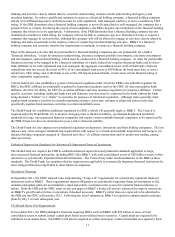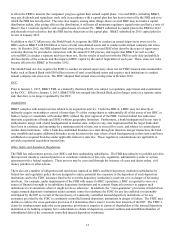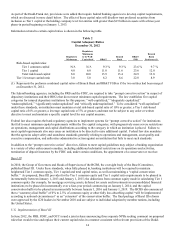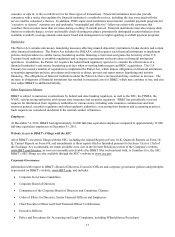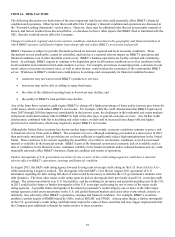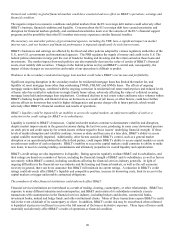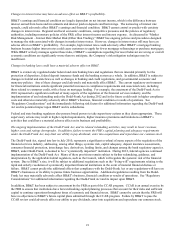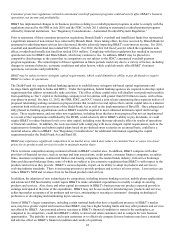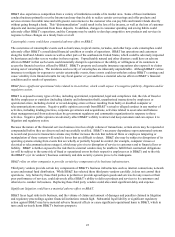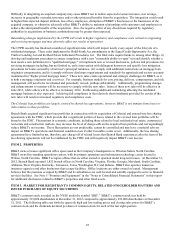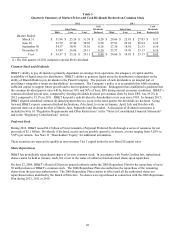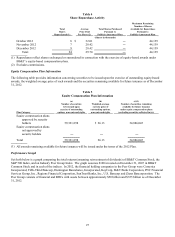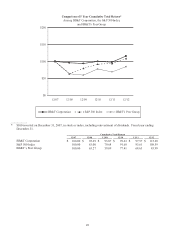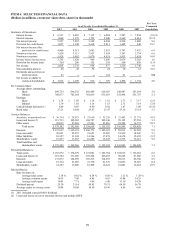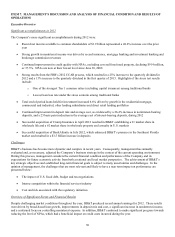BB&T 2012 Annual Report Download - page 42
Download and view the complete annual report
Please find page 42 of the 2012 BB&T annual report below. You can navigate through the pages in the report by either clicking on the pages listed below, or by using the keyword search tool below to find specific information within the annual report.20
Turmoil and volatility in global financial markets could have a material adverse effect on BB&T’s operations, earnings and
financial condition.
The negative impact on economic conditions and global markets from the EU sovereign debt matters could adversely affect
BB&T’ s business, financial condition and liquidity. Concerns about the EU sovereign debt have caused uncertainty and
disruption for financial markets globally, and continued uncertainties loom over the outcome of the EU’ s financial support
programs and the possibility that other EU member states may experience similar financial troubles.
The monetary, tax and other policies of governmental agencies, including the FRB, have a significant impact on market
interest rates, and our business and financial performance is impacted significantly by such interest rates.
BB&T’ s businesses and earnings are affected by the fiscal and other policies adopted by various regulatory authorities of the
U.S., non-U.S. governments and international agencies. The FRB regulates the supply of money and credit in the U.S. The
federal policies determine in large part the cost of funds for lending and investing and the return earned on those loans and
investments. The market impact from such policies can also materially decrease the value of certain of BB&T’ s financial
assets, most notably debt securities. Changes in the federal policies are beyond BB&T’ s control and, consequently, the
impact of these changes on our activities and results of our operations is difficult to predict.
Weakness in the secondary residential mortgage loan markets could reduce BB&T’s net income and profitability.
Significant ongoing disruption in the secondary market for residential mortgage loans has limited the market for, and
liquidity of, most mortgage loans other than conforming FNMA, FHLMC and GNMA loans. The effects of ongoing
mortgage market challenges, combined with the ongoing correction in residential real estate market prices and reduced levels
of home sales has resulted in reductions in single family home values, adversely affecting the value of collateral securing
mortgage loans held and mortgage loan originations. Continued declines in real estate values and home sales volumes within
BB&T’ s banking footprint, and financial stress on borrowers as a result of job losses, or other factors, could have further
adverse effects on borrowers that result in higher delinquencies and greater charge-offs in future periods, which would
adversely affect BB&T’ s financial condition and results of operations.
BB&T’s liquidity could be impaired by an inability to access the capital markets, an unforeseen outflow of cash or a
reduction in the credit ratings for BB&T or its subsidiaries.
Liquidity is essential to BB&T’ s businesses. Capital and credit markets continue to demonstrate volatility and disruption,
despite modest improvements in the general economy during the last two years, producing in some cases downward pressure
on stock prices and credit capacity for certain issuers without regard to those issuers’ underlying financial strength. If these
levels of market disruption and volatility continue, worsen or abate and then arise at a later date, BB&T’ s ability to access
capital could be materially impaired. Additionally, other factors outside of BB&T’ s control, such as a general market
disruption or an operational problem that affects third parties, could impair BB&T’ s ability to access capital markets or create
an unforeseen outflow of cash or deposits. BB&T’ s inability to access the capital markets could constrain its ability to make
new loans, to meet its existing lending commitments and ultimately jeopardize its overall liquidity and capitalization.
BB&T’ s credit ratings are also important to its liquidity. Rating agencies regularly evaluate BB&T and its subsidiaries, and
their ratings are based on a number of factors, including the financial strength of BB&T and its subsidiaries, as well as factors
not entirely within BB&T’ s control, including conditions affecting the financial services industry generally. In light of
ongoing difficulties in the financial services industry and the housing and financial markets, as well as the soft economic
recovery in general, there can be no assurance that BB&T will maintain its current ratings. A reduction in BB&T’ s credit
ratings could adversely affect BB&T’ s liquidity and competitive position, increase its borrowing costs, limit its access to the
capital markets or trigger unfavorable contractual obligations.
The soundness of other financial institutions could adversely affect BB&T.
Financial services institutions are interrelated as a result of trading, clearing, counterparty, or other relationships. BB&T has
exposure to many different industries and counterparties, and BB&T and certain of its subsidiaries routinely execute
transactions with counterparties in the financial services industry, including brokers and dealers, commercial banks,
investment banks, mutual and hedge funds, and other institutional clients. Many of these transactions expose BB&T to credit
risk in the event of default of its counterparty or client. In addition, BB&T’ s credit risk may be exacerbated when collateral
is liquidated at prices not sufficient to recover the full amount of the loan or derivative exposure. These types of losses could
materially and adversely affect BB&T’ s results of operations or financial condition.



